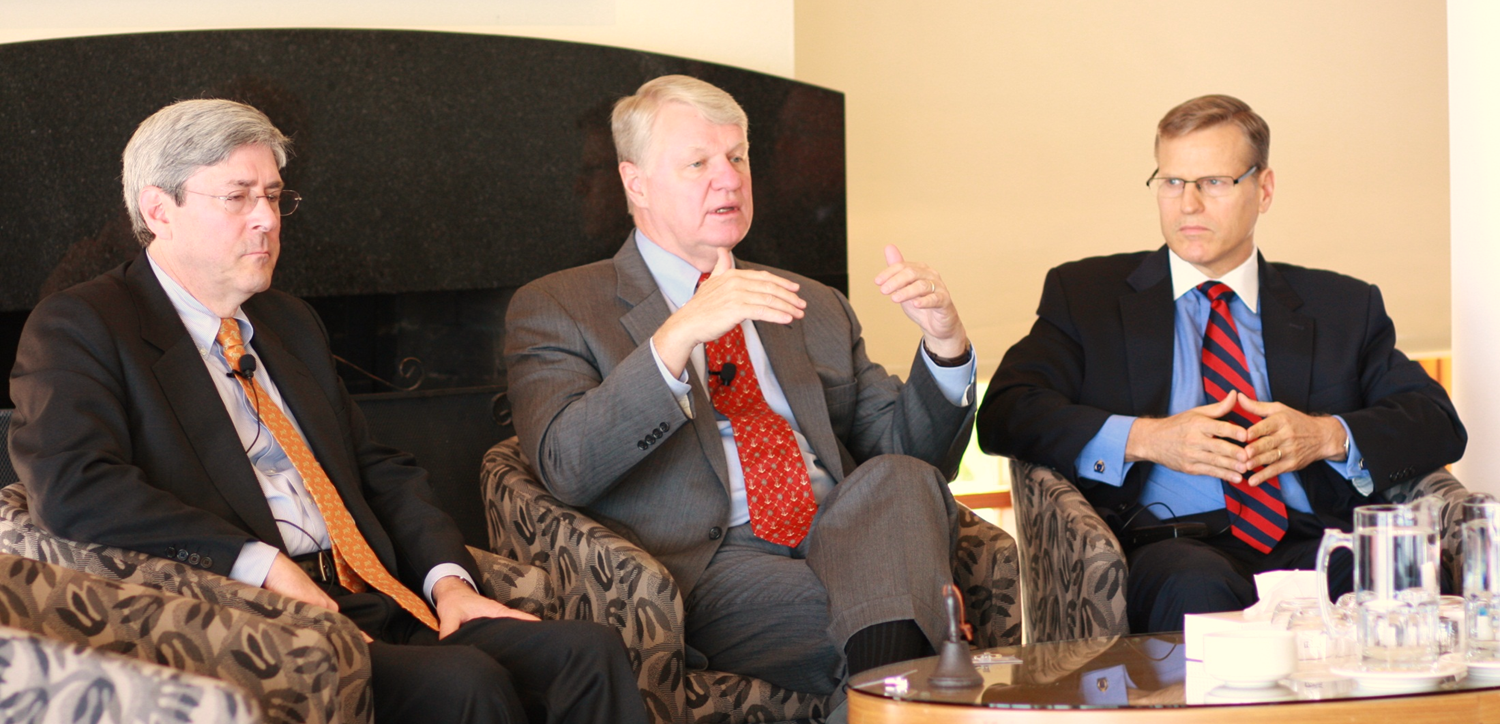
Sometimes an aside illuminates the important underlying drivers of issues. At Wednesday’s ASPI–Hewlett-Packard
Defence and Security Lunch, retired US Admiral Gary Roughead mused briefly about rebalancing of US forces to the Pacific. Pressed later to elaborate, he suggested the change in focus would have significant ramifications for resource allocations: in other words, who gets the money. What makes this fraught is the increasingly constrained military budget. The conditions are ripe for a turf war between the services.
Over the past decade the focus has been on land conflict. Sure, there’s been a significant role for precision missiles and air assets have also played a part—particularly in intelligence collection. But everything has been, essentially, devoted to winning the fight on the ground: it’s been an Army-led war. This will change with the withdrawal of ground troops from Afghanistan.
The title of the US’s new fighting doctrine—Air Sea Battle—offers a clear indication of where the resources will be going. The inability of the Army to achieve unequivocal victory was already apparent when Secretary of Defence Leon Panetta signed-off on this new operational concept in 2011. It was recognition that, even leveraging off America’s overwhelming technical superiority, land forces still hadn’t been able to secure the victory Washington desired.
That’s why the US is instead switching attention to arenas where its technological lead might pay off. The Air Force and Navy will now get the lion’s share of resources. It’s much easier for politicians to keep defence industry lobbies happy by approving new contracts for planes and ships than it is raising extra army units. Secondly (perhaps unfairly) the Army’s credit in Washington isn’t very high at the moment. Nobody blames the soldiers for not being more successful in Afghanistan, but the limitations of ‘boots on the ground’ are becoming apparent. And the maritime nature of the Pacific theatre further strengthens the hand of the Navy and (to a lesser extent) the Air Force at the expense of the Army.
Don’t expect any loud announcements, but by all accounts there’s a new dynamic at work in Washington. This will shuffle more money to the Navy and Air Force; less to the Army. Interestingly, a similar struggle for resources has begun here in Australia.
A couple of months ago (and again at an ASPI function), Air Marshal Geoff Brown made a
strong pitch emphasising the urgency of maintaining a strong air force. He described a recent exercise where the air commander needed to deploy all his assets. There was absolutely nothing in reserve.
Last week Lieutenant General David Morrison presented the army’s case at a
University of Canberra Security Lecture. He made an urgent plea for politicians to remember ‘only the man who occupies ground can proclaim victory’. Brendan Nicholson from the Australian newspaper had somehow got hold of a copy of the speech before delivery. His ensuing front-page article ensured considerable media attention.
The story was simple: don’t cut funding for the military. Journalists know this is a much better yarn than explaining the intricacies of intra-service fights for resources. But don’t be fooled: that’s what it was all about. The next government, Labor or Liberal, will slash the defence budget. These are attempts to limit the damage to individual services. It also seems likely we’ll receive two White Papers within the next three years. Cynics think their main role will be to provide political ‘cover’ allowing extra cutbacks to be justified.
In this environment it’s possible to understand the Chiefs’ recent comments as pleas for their respective services. Nobody doubts their strong commitment to, and belief in, the doctrines they’re articulating. Unfortunately, not everyone can be a winner as resources shrink. It will be interesting to see if appealing over the heads of the politicians and speaking to the electorate is the right strategy. It might backfire.
Nic Stuart is a columnist with the Canberra Times. Image courtesy of Luke Wilson, ASPI. Print This Post
Print This Post Sometimes an aside illuminates the important underlying drivers of issues. At Wednesday’s ASPI–Hewlett-Packard Defence and Security Lunch, retired US Admiral Gary Roughead mused briefly about rebalancing of US forces to the Pacific. Pressed later to elaborate, he suggested the change in focus would have significant ramifications for resource allocations: in other words, who gets the money. What makes this fraught is the increasingly constrained military budget. The conditions are ripe for a turf war between the services.
Sometimes an aside illuminates the important underlying drivers of issues. At Wednesday’s ASPI–Hewlett-Packard Defence and Security Lunch, retired US Admiral Gary Roughead mused briefly about rebalancing of US forces to the Pacific. Pressed later to elaborate, he suggested the change in focus would have significant ramifications for resource allocations: in other words, who gets the money. What makes this fraught is the increasingly constrained military budget. The conditions are ripe for a turf war between the services.